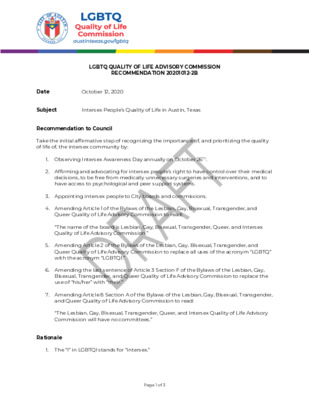Backup — original pdf
Backup

Date LGBTQ QUALITY OF LIFE ADVISORY COMMISSION RECOMMENDATION 20201012-2B October 12, 2020 Intersex People’s Quality of Life in Austin, Texas Subject Recommendation to Council Take the initial affirmative step of recognizing the importance of, and prioritizing the quality of life of, the intersex community by: 1. Observing Intersex Awareness Day annually on October 26th. 2. Affirming and advocating for intersex people’s right to have control over their medical decisions, to be free from medically unnecessary surgeries and interventions, and to have access to psychological and peer support systems. 3. Appointing intersex people to City boards and commissions. 4. Amending Article 1 of the Bylaws of the Lesbian, Gay, Bisexual, Transgender, and Queer Quality of Life Advisory Commission to read: “The name of the board is Lesbian, Gay, Bisexual, Transgender, Queer, and Intersex Quality of Life Advisory Commission.” 5. Amending Article 2 of the Bylaws of the Lesbian, Gay, Bisexual, Transgender, and Queer Quality of Life Advisory Commission to replace all uses of the acronym “LGBTQ” with the acronym “LGBTQI.” 6. Amending the last sentence of Article 3 Section F of the Bylaws of the Lesbian, Gay, Bisexual, Transgender, and Queer Quality of Life Advisory Commission to replace the use of “his/her” with “their.” 7. Amending Article 8 Section A of the Bylaws of the Lesbian, Gay, Bisexual, Transgender, and Queer Quality of Life Advisory Commission to read: “The Lesbian, Gay, Bisexual, Transgender, Queer, and Intersex Quality of Life Advisory Commission will have no committees.” Rationale 1. The “I” in LGBTQI stands for “intersex.” Page 1 of 3 2. 3. 4. 5. 6. 8. Intersex is an umbrella term for differences in sex traits or reproductive anatomy. People are born with these differences or develop them in childhood. There are many possible differences in genitalia, hormones, internal anatomy, or chromosomes. Intersex traits are natural human variations, not disorders. Intersex people are not rare. One in two thousand babies (approximately 1.7% of the population) are born intersex, which equates to more than 16,000 people in the City of Austin. Infant intersex surgeries violate principles of informed consent, bodily autonomy, and self-determination. Intersex people, like anyone, can have any gender and any sexual orientation. 7. While the intersex community has some things in common with LGBTQ communities, being intersex is not the same thing as being transgender or nonbinary, and it’s not a sexual orientation. A person can have intersex bodily differences and be transgender or nonbinary, but an intersex person isn’t automatically one of these things. Even though intersex is about physical anatomy, anatomy is not the same thing as gender. Lots of intersex people do describe their gender as male or female. Intersex people face very similar issues to LGBTQ people. Some, but not all, intersex people are also LGBTQ. Intersex people are told they are “disordered,” just like LGBTQ people have been told for decades. Homophobia and transphobia are the reasons behind many of the problems intersex people face. It is critical that LGBTQ people work with intersex people to combat these systems of oppression and advocate for quality of life for everyone in the LGBTQI community. 1. interACT Advocates for Intersex Youth 2. Sexing the Body: Gender Politics and the Construction of Sexuality, 2000 Sources 3. QWELL Community Foundation Page 2 of 3 Vote Date of Approval: Motioned By: Seconded By: For: Against: Abstain: Absent: Attest: _____________________________________________ Kathryn Gonzales, Vice Chair Page 3 of 3